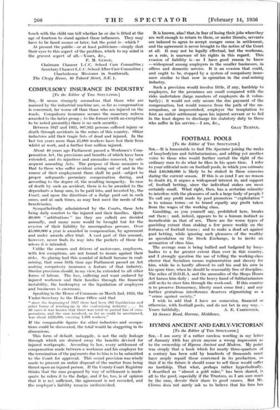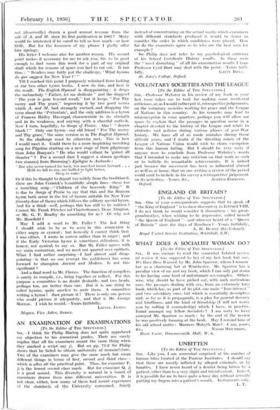HYMNS ANCIENT-AND EARLY-VICTORIAN
[To the Editor of Tux StEcra.roa.] Sia,—I am sorry if a -rather careless wording in my letter of January 24th has given anyone a wrong impression as to the ownership of Hymns Ancient and Modern. My point was simply that a book which for nearly three-quarters of a century has been sold by hundreds of thousands must have if repaid those cOnt erred in its prodUction, so that if in the future it should cease to -sell these would suffer no hardshiP., That what, perhaps rather hyperbolically, I described as "'almost a , gold mine," has been shared, is all to the -good,- especially if the Trustees, as I am sure must be. the 'case, &Vote- their *share 16' good 'causes: But Mr. ClOWei doei- not surely ask 'us to believe that his firm has not (deservedly) drawn a good annual. revenue from the side'ot A and M. since its first pnblication in 1861? Many would be interested if'he cared to tell us how muchor how little. But for the looseness of my phraSe gladly offer him apology; - His letter I welcome also- for another reason. His second point makes it necessary for me to ask yon, Sir, to be good enough to fund room this week for a part of my original draft which for reasons of space you had to cut out. It 'ran thus :. " Readers may fairly put the challenge, ' What hymns do you suggest for New Year ? ' " Till' I reached this point I purposely refrained from looking at the two other hymn books. I now do this, and here is the result. The English Hymnal is disappointing : it drops the melancholy " Father, let me dedicate " and the doggerel " The year is gone beyond recall," but it keeps " For Thy mercy and Thy grace," -improving it by two good verses which A. and M. had strangely excised, and dropping the verse about the Pottentate', and the only addition is a hymn of Frances Ridley Havergal, characteristic in its strength and in its weakness, and anyway with a cheerful outlook. Now I turn, hopefully, to Songs of Praise. Alas ! " drawn blank ! " Only one hymn—our old friend " For Thy mercy and Thy grace," the same version as in The English Hymnal.
So the challenge must be otherwise met. This is how I would meet it. Could there be a more 'inspiriting marching song for Pilgrims starting on a new stage of their pilgrimage than John Bunyan's "'He 'who would valiant be 'gainst all disaster" ? For a second dare I suggest a stanza (perhaps two stanzas) from Browning's Epilogue to Asolando :
"But who never turned his back, but marched breast forward . . . 'Held we fall to rise, are baffled to fight better, ' Sleep to wake."
Or if this be thought to depart too widely from the traditional, there are John Cennick's beautifully simple lines—these too a marching song—" Children of the' heavenly King." It is- due to Songs of Praise to say that this and the Bunyan hymn both occur in the list of hymns suitable for New Year (twenty-four of them) which follows the solitary special hymn. And for a' third—well, perhaps this has still to be written ? Cannot Mr. Frank Fletcher-(of Charterhouse), Dean Alington, or Mr. G. F. Braclby do something for us ? Or why not Mr. Masefield ?
'May I add a word to Mr. Fuller ? The last thing I -should wish to be or to seem in this connexion is either angry or cynical ; but honestly I cannot think that I was either. I wrote in sorrow rather than in anger ; and if the Early Victorian hymn is sometimes ridiculous, it is honest, not cynical, to say so. But Mr. Fuller agrees with my main contention, and we need not quarrel over epithets. What' I. find rather surprising—I had almost said disap- pointing—is that no one (except the publishers) has come forward to champion Ancient and Modern. Is not this significant'?'• And' a'final word to Mr. Clowes. The function of compilers is surely to compile, i.e., bring together or collect. For this purpose a committee is no doubt desirable, and two heads, perhaps ten, are better than one. But• it is one thing to collect hymns, quite another to write them. A committee writing a hymn ! Just picture it ! There is only one person who could picture it adequately, and that is Mr. George Morrow. I wish he would.—Yours faithfully,















































 Previous page
Previous page